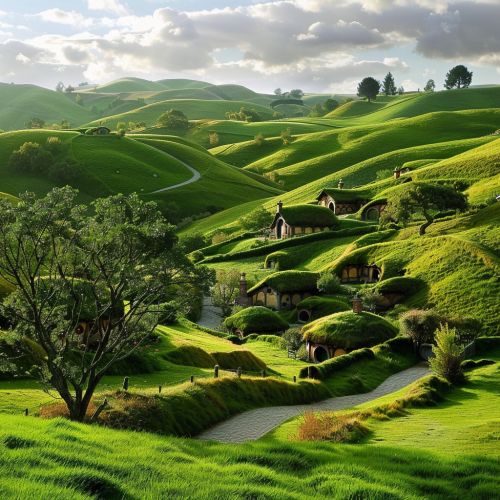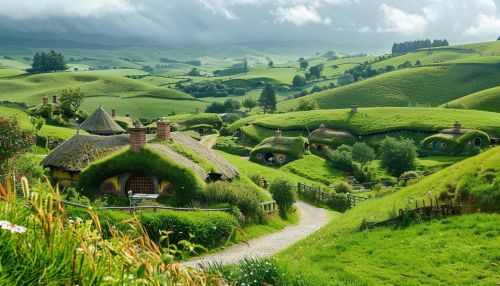The Shire: Difference between revisions
(Created page with "== Introduction == The Shire is a region in the fictional world of Middle-earth, created by the author J.R.R. Tolkien. It is primarily inhabited by Hobbits and is characterized by its pastoral and agrarian lifestyle. The Shire plays a significant role in Tolkien's works, particularly in "The Hobbit" and "The Lord of the Rings" series. == Geography == The Shire is located in the northwest of Middle-earth, in the region of Eriador. It is bordered by the River Brandywine t...") |
No edit summary |
||
| Line 5: | Line 5: | ||
The Shire is located in the northwest of Middle-earth, in the region of Eriador. It is bordered by the River Brandywine to the east, the Far Downs to the west, the North Moors to the north, and the Southfarthing to the south. The region is divided into four Farthings: Northfarthing, Southfarthing, Eastfarthing, and Westfarthing. | The Shire is located in the northwest of Middle-earth, in the region of Eriador. It is bordered by the River Brandywine to the east, the Far Downs to the west, the North Moors to the north, and the Southfarthing to the south. The region is divided into four Farthings: Northfarthing, Southfarthing, Eastfarthing, and Westfarthing. | ||
[[Image:Detail-92943.jpg|thumb|center|A picturesque landscape of rolling hills, green fields, and small cottages in The Shire.|class=only_on_mobile]] | |||
[[Image:Detail-92944.jpg|thumb|center|A picturesque landscape of rolling hills, green fields, and small cottages in The Shire.|class=only_on_desktop]] | |||
=== Topography === | === Topography === | ||
Latest revision as of 20:12, 21 June 2024
Introduction
The Shire is a region in the fictional world of Middle-earth, created by the author J.R.R. Tolkien. It is primarily inhabited by Hobbits and is characterized by its pastoral and agrarian lifestyle. The Shire plays a significant role in Tolkien's works, particularly in "The Hobbit" and "The Lord of the Rings" series.
Geography
The Shire is located in the northwest of Middle-earth, in the region of Eriador. It is bordered by the River Brandywine to the east, the Far Downs to the west, the North Moors to the north, and the Southfarthing to the south. The region is divided into four Farthings: Northfarthing, Southfarthing, Eastfarthing, and Westfarthing.


Topography
The Shire's landscape is predominantly composed of rolling hills, fertile fields, and small forests. The region is well-watered by numerous rivers and streams, which contribute to its lush vegetation. The most notable waterway is the River Brandywine, which serves as the eastern boundary of the Shire.
Climate
The Shire enjoys a temperate climate with mild winters and warm summers. The region experiences ample rainfall, which supports its agricultural economy. The climate is generally stable, with few extreme weather events, making it an ideal place for farming and gardening.
History
The history of the Shire dates back to the Third Age of Middle-earth. It was founded by Hobbits who migrated westward from the region of Bree. The official founding date is recorded as T.A. 1601, when the brothers Marcho and Blanco led a group of Hobbits across the River Brandywine and established the first settlements.
Early Settlement
The early settlers of the Shire were primarily agrarian, focusing on farming, horticulture, and animal husbandry. The fertile land and favorable climate allowed the Hobbits to thrive, and the population grew steadily over the centuries.
Political Structure
The Shire is governed by a decentralized political system. The Thain is the traditional leader of the Shire, a position held by the head of the Took family. The Mayor of Michel Delving is another significant political figure, responsible for administrative duties. The Shirriffs are the local law enforcement, maintaining peace and order within the region.
Economy
The economy of the Shire is predominantly agrarian, with farming being the primary occupation of its inhabitants. The fertile soil and favorable climate support the cultivation of various crops, including grains, vegetables, and pipe-weed.
Agriculture
Agriculture is the backbone of the Shire's economy. The Hobbits are skilled farmers, known for their expertise in growing crops and raising livestock. The Southfarthing is particularly famous for its production of pipe-weed, a popular commodity in Middle-earth.
Trade
While the Shire is largely self-sufficient, it does engage in trade with neighboring regions. The Hobbits trade their agricultural produce, particularly pipe-weed, with the Men of Bree and other nearby settlements. This trade is facilitated by the Great East Road, which runs through the Shire.
Culture
The culture of the Shire is deeply rooted in its agrarian lifestyle. The Hobbits are known for their love of simple pleasures, such as good food, drink, and companionship. They value community, family, and tradition, and their way of life is characterized by a strong sense of hospitality and generosity.
Festivals and Celebrations
The Hobbits of the Shire celebrate numerous festivals and holidays throughout the year. These events often revolve around agricultural cycles and include feasts, games, and communal gatherings. Some of the most notable celebrations include Yule, Lithe, and the Harvest Festival.
Language
The primary language spoken in the Shire is Westron, also known as the Common Speech. However, the Hobbits have their own dialect and unique expressions that reflect their rural lifestyle and close-knit community.
Architecture
The architecture of the Shire is distinctive and reflects the Hobbits' connection to the land. Hobbit-holes, or smials, are the most common type of dwelling. These are underground homes built into the sides of hills, featuring round doors and windows.
Building Materials
Hobbit-holes are constructed using locally sourced materials, such as stone, wood, and earth. The interiors are cozy and well-furnished, with an emphasis on comfort and practicality.
Notable Structures
Some of the most notable structures in the Shire include Bag End, the home of Bilbo and Frodo Baggins, and the Great Smials, the ancestral seat of the Took family. The Green Dragon Inn in Bywater is another famous establishment, serving as a popular gathering place for Hobbits.
Flora and Fauna
The Shire is home to a diverse array of flora and fauna, supported by its fertile land and temperate climate. The region's natural beauty is a source of pride for its inhabitants and plays a significant role in their daily lives.
Plant Life
The Shire's landscape is dotted with a variety of trees, including oak, elm, and willow. The region is also known for its lush gardens, where Hobbits cultivate flowers, herbs, and vegetables. Pipe-weed, a type of tobacco, is one of the most famous plants grown in the Shire.
Animal Life
The Shire is inhabited by numerous animal species, both domesticated and wild. Hobbits raise livestock such as sheep, cows, and chickens, which provide them with food and other resources. Wild animals, including rabbits, foxes, and birds, are also commonly found in the region.
Social Structure
The social structure of the Shire is relatively egalitarian, with a strong emphasis on community and family. While there are some prominent families, such as the Tooks and the Bagginses, the Hobbits generally live in harmony without rigid class distinctions.
Family and Kinship
Family is the cornerstone of Hobbit society. Extended families often live close to one another, maintaining strong bonds and mutual support. Kinship ties are celebrated through regular gatherings and communal activities.
Occupations
Most Hobbits are engaged in farming or related occupations. However, there are also craftsmen, traders, and innkeepers who contribute to the local economy. The Shirriffs, responsible for law enforcement, are another important occupational group.
